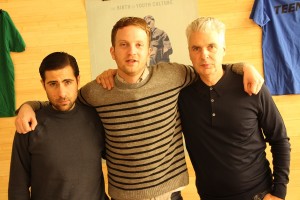Tribeca Talks — Adolescence’s Coming of Age Story: Matt Wolf, Jon Savage and Jason Schwartzman on Their New Documentary ‘Teenage’
Wolf: Really?
Schwartzman: Not — if I’ve watched them at the premiere, and then all that, I mean, I would never watch one again ever. Unless it was for like a girl who wanted to sit down and we can watch… [Laughter] No, I’m married. [Laughter] But no, I see no reason to do that for myself, I’m just too critical. But last night, it’s not about me, it’s just about feeling pride for my friends and cheering for them, so that’s really the difference.
GALO: Your character Max Fischer in Rushmore is a teenager struggling to find his place in the world. Have you always been interested in exploring this stage of life, whether via acting or other means?
Schwartzman: Not intentionally, but I think no matter where you are in life, I’m always cautious of people that say they have it figured out. So I think you’re always trying to adjust to your surroundings. I think that’s why you like music or anything, because it’s a way to express those types of situations…That wasn’t an answer, but that was also intentional. [Laughs]
I don’t set out to go to work and go, “How can I express not fitting in?” But I will say it’s more interesting dramatically to me when I read a script where a character is on the edge of a new phase of their life, and they either have a choice to go for it or not for it. It’s more dramatically interesting to me.
I will say, it would be fun to watch a movie where the guy just, everything is just great. For two hours, let’s see what that’s like.
Savage: What would the music be, though? [Laughter]
GALO: You know, I’m surprised you didn’t use any “Baba O’Riley” [by The Who], “Teenage Wasteland” in the score.
Savage: I was very happy with the score, because Matt and I overlap; our tastes overlap in that we really like modern electronic music. Specific answer to your question, we never really thought about using rock classics, because they’re so specific, and they’re tied into a generation only.
As a music fan — in a way, this ties into what Jason was saying — I don’t stop with the music of my youth, although I think it’s very important. I’m interested in what’s happening now and next. So I really like electronic music, modern electronic music, and there’s a lot of that in the film. And Matt made those choices.
GALO: What was the most rewarding part of the project for all of you?
Wolf: For me it was just collaborating with different people. It’s figuring out what peoples’ strengths are, and how we’re different, and trying to learn from them and draw on their experiences; just forming new relationships, both personally and creatively, with different people. It’s the biggest film I’ve ever made, the most collaborative thing I’ve ever done. Just that process of collaboration was really exciting for me.
Savage: I would agree. I still can’t believe that the film’s been made. I started working on this in 1980. That was the first time I ever really wanted to tackle the subject, and that was in a memo when I worked in television in the UK. This has been a long, long process for me. I’m just incredibly happy with the film, and I have to thank Matt and Jason, and many other people.
Schwartzman: I’m really happy because it’s been a really inspiring lesson in getting it how you want it. Being with Matt, several times we would go and try to talk to different people about the movie and though they loved the idea, it was hard sometimes. People, they couldn’t visualize. To be with Matt, and to know that he had an idea in his head and it was obvious, and when things are a no brainer to you, to not be deterred by anything.
And I don’t mean to say that people…I don’t want to give the impression that it was insane. I just love how when [Matt and I] first met, and [Matt] first told the thing, it was like, “Yes, that is right,” and it was beautiful to see it last night, and I was watching it and going, “Yes, that’s exactly what we were talking about.”
Savage: And that’s what’s great, and that’s where we’ve been really lucky, in that the film is actually almost 100 percent true to the original vision that we had, which is really hard in making films.
Schwartzman: And it surprised you. I heard a great quote — this is too dirty, but it’s a great quote — the writer George Saunders quotes another writer as saying that if you set out to write a poem about two dogs fucking, then you write a poem about two dogs fucking, all you’ve written is a poem about two dogs fucking. [Laughter] And I love the idea behind that, because he’s saying it should surprise you as you’re working on it. And I think that it was, as you’re describing, all the various steps, it was a surprise to all of you. You all learned. So it’s true to the original vision and beyond.
“Teenage” premiered at the Tribeca Film Festival in New York City on April 20.
Featured image: (Left to right) Jason Schwartzman, Matt Wolf and Jon Savage, the creators of “Teenage.” Photo Credit: Tim Pierson.


